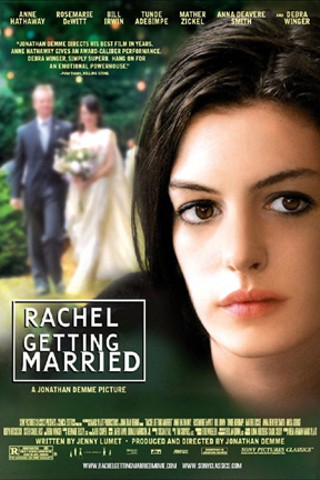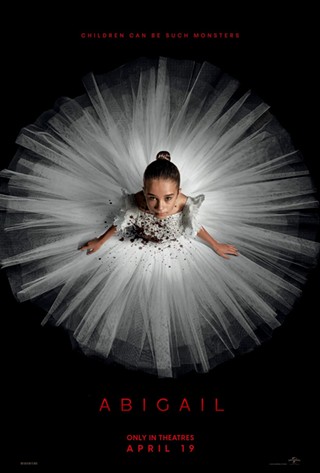But instead, he goes around making little documentaries and the sorts of movies that people get involved with because they care about something besides tumbling naked into a giant vat of gold coins. In essence, Demme would rather be an artist than an entrepreneur, and that's pretty admirable, even if he made the decision after he'd already earned a million billion dollars for making movies about cannibals.
It's a little sad, then, that he's not a lot better at what he does. I mean, he's good. He's better than me, so, you know. But still, Rachel Getting Married, though a very decent film, is not quite the best movie about uncomfortable things happening at a nontraditional wedding. It's not even the best such film of the last five years; that'd be Margot at the Wedding.
But it's still pretty good, and I'd recommend it to most cinephiles--as long as you keep expectations in check. You'll enjoy its visual inventiveness, its naturalistic script and, most importantly, some stunning performances by Bill Irwin, Rosemarie DeWitt, Anisa George and Tunde Adebimpe, or, as they're better known, "Huh?"
Of that bunch, only Irwin has anything like name recognition, and what he's got is merely like name recognition. Nonetheless, as the father of the bride (DeWitt) and the bride's difficult, beautiful, attention-seeking, recovering-drug-addict sister (Anne Hathaway), Irwin's elastic face and capacity to imply the presence of 15 conflicted and suppressed emotions at once produces a performance like that of a suicidal bonobo who's been forced into a job as a sales manager at a suburban real estate agency. You know: fraught.
His desperate efforts to keep his family from exploding while still maintaining an expression that says, "Everything's OK; don't mind the bloody patches on the wall," ties the film together. But the focus is more on Hathaway as former teen model and guilt-ridden 12-stepper Kym, and while she's very good in the role, she gives the least-interesting performance in the film. The film starts with her getting a furlough from rehab so she can attend sister Rachel's titular wedding (yes, the wedding is actually titular) at the hippie-ish Connecticut home that her dad has turned into a haven for his multigenerational and interracial assortment of music buddies, including, strangely, Robyn Hitchcock, and also including, sort of, Tunde Adebimpe, lead singer of TV on the Radio.
Adebimpe plays Sidney, the weirdly silent groom. Sidney is in the music industry in some undisclosed way, but what makes the character so interesting is Adebimpe's unfocused stares and inscrutable acting style. He wears eyeglass frames that seem to have fallen out of the sky from a passing chunk of 1977, is always looking blankly but disturbingly into some nearby space, and only seems to come to life in a single moment, when he challenges his future father-in-law to a dishwasher-loading contest.
It's the tensest dishwasher-loading contest ever filmed. I'd give Demme and screenwriter Jenny Lumet credit on this, but they're blessed to be working with Adebimpe and Irwin, so who knows where proper praise should fall? In any case, this scene is devastating. When Sidney suggests that the dishwasher could be more efficiently loaded, the dialogue and performances occupy that unpleasant null space between jokes and hatred. Though the scene is ultimately ruined by a cheap Writing 101 ending, up to that point, it's brilliantly ambiguous, rich with the feeling that it could burst into comedy or terror at any moment.
But it does end with that cheap bit, which I won't give away, and that's a tremendous letdown. Much of the film has this feel: Everything is on the edge, but then there are a host of stock go-to moments, like the Confrontation With Mom, or the Reveal of the Horrible Memory, or the Tearful Reconciliation. I mean, have one or two of those, but this film interrupts its beautifully uncomfortable meanderings every 20 minutes for something that seems like it was pulled out of the writing school story-bag.
Which is strange, because when Rachel Getting Married is not doing that, it's deeply inventive. Demme favors tight, tight shots with handheld cameras, giving the whole thing the feel of a wedding video that's been staged by David Lynch's evil pet monkey. The set design is brilliant, capturing the sort of overwealthy bohemianism that's sure to produce teenage chemical experimentation, and the music is largely played in-scene by the various musicians wandering around the house, à la the Dogme films of the '90s. The soundtrack is a mix of circus music, Indian traditional music, Robyn Hitchcock's mildly annoying look-at-me pop, grand marching numbers and incomprehensible olios that are muted by closed doors and that fade in and out when the camera chases Hathaway around the house.
As an experiment in filmmaking, and for performances by human-looking people who make Hollywood's cavalcade of plastic-surgery robots look like the demi-humans they are, Rachel Getting Married is well worth seeing. It falls a little short of where it could have been, but that's also true of most human endeavors, so what the hell.











